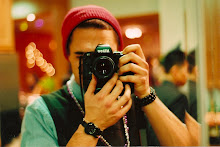i like the angle that was taken in this chapter...it was not what i expected. after reading the crit, which was from the view of a student, i expected the same thing from the studio visit. i thought it was going to be the kind of studio visits that i go through in which an instructor come to evaluate your current works and progress. instead we visited the studio space of a working, and successful, artist, takashi murakami.

takashi is a valid artist for us to investigate. he has had a direct influence on our culture from fashion collaborations with marc jacobs at louis vuitton to music artwork for kanye west to fine art of his own.


points of interest...
i really like the idea and purpose of kaikai kiki co., ltd., run by murakami. "it makes art. it designs merchandise. it acts as a manager, agent, and producer for seven other japanese artists." it is a fully self-sustainable artist collective in which little to no outsourcing or external services would be required. to me that's a very raw and beautiful concept this day in age.
"i like to think that i have a more honest relationship with our artists than some other dealers, but i don't want to be anyone's shrink." this quote calls a few things to mind for me. first i think about the stereotype that artists have delicate, little minds and are ofter crazy, for lack of a better term. why is this? just because we think in a different manner and view the world differently than most people? when thinking about a shrinks job [basically to figure someone out] i related it to the actual work and how people feel the need to 'figure it out.' how come the first thing non-artists ask is 'what does this mean?' why does it have to mean something? take it for what it is sometimes. why don't more artist reply 'nothing' if they don't have an answer? it's something i've come across when thinking about my own work. i'm gunna' start saying 'nothing.'
"a studio isn't just a place where artists make art but a platform for negotiation and a stage for performance." i think there's a lot more that can go in this sentence...compromise, self-discovery, success, failure...the list can obviously go on. the studio is important. its a safe haven and an escape, as cliche as that may be. instead of having an office with a desk i have a studio with an easel. its also interesting to think about long hours spent in the studio as a performance...
"takashi"s practice makes warhol look like a lemonade stand or a school play." that's quite a bold statement based on how revolutionary warhol's method were. i wonder what basis this statement was made on because there are many possibilities...the quality of the work, the amount of the work, the aesthetic, the process, the overall operation. i wonder how murakami would react to this statement after he was earlier quoted as saying, "i like everything [about warhol]...i am jealous of warhol." so on one account he is out-shining an idol. i don't think that was ever an objective of his, he probably wouldn't feel as if he has surpassed warhol at all.
"i'm a big fan of marcel duchamp and his ready-mades...changing the context of an object is, in and of itself, art." i don't want to say i was surprised by jacobs' reaction or knowledge of this subject because he is definitely an artist in his own right, but i didn't expect his eloquence, humbleness and thoughtful insight. i happen to feel the same way about that infamous fountain. just because someone can do it doesn't mean they did. i think it's totally creative and innovative. duchamp was definitely an interesting mind...jeff poe definitely wouldn't want to be his shrink.


No comments:
Post a Comment